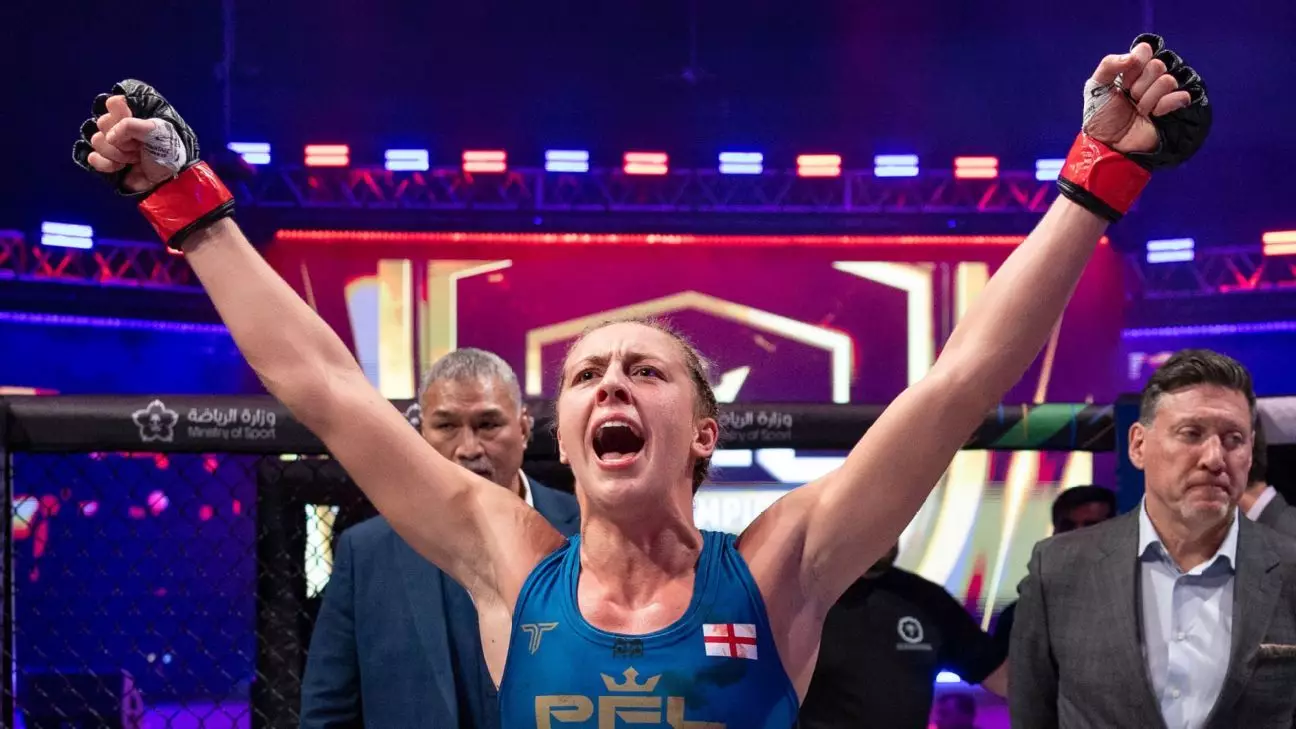Dakota Ditcheva, often heralded as one of the most exciting talents in women’s mixed martial arts (MMA), has recently found herself at the center of trade discussions between two major promotions: the Professional Fighters League (PFL) and the Ultimate Fighting Championship (UFC). Fresh off a decisive victory that secured her the PFL title, the undefeated fighter is now navigating her career with a keen awareness of both her potential and the interests of major organizations seeking to capitalize on her burgeoning reputation.
In the competitive landscape of women’s MMA, Ditcheva stands out, not just due to her impeccable record of 14-0, but also because of her impressive finishing ability, with 12 of those wins coming via knockout. Her recent win against Taila Santos, a former UFC title contender, showcased not only her striking prowess but also her capability to compete at elite levels. The journey she has forged within the PFL this year, culminating in four knockouts, positions her as a formidable fighter on a global scale.
Yet, this newfound spotlight has stirred interest from the UFC, leading to speculative discussions around a potential trade. According to Ditcheva, the PFL has declined such an offer, citing the organization’s interest in retaining her talents. The nuances of promotional negotiations often remain behind closed doors, but Ditcheva’s remarks illuminate a crucial aspect of her current status: PFL views her not just as a champion, but as a significant asset for their future ambitions.
Understanding the backdrop of MMA promotions is essential to grasp the significance of the UFC’s interest in Ditcheva. Historically, the UFC has engaged in deals with other promotions to amplify their roster, the exchange between Demetrious Johnson and Ben Askren serving as a prime example. The UFC’s strategic acquisition of top-tier talent has often led to exciting matchups and increased viewer engagement.
Yet, the economics of such trades depend on numerous factors, primarily the marketability of the fighter involved. For Ditcheva, her youth, charisma, and fighting style align well with the UFC’s ongoing efforts to build a compelling women’s division. The potential for a high-impact arrival in the UFC suggests her star power could foster exciting outcomes for both her career and the promotion—however, her current commitment to the PFL is nonetheless significant and not to be underestimated.
While the allure of joining the UFC may seem enticing, Ditcheva’s focused mindset suggests that her journey within the PFL is far from over. She has voiced desires to bring more events to her home country, including a potential card in Manchester—a move that would not only enhance her visibility but also connect her more deeply with fans.
Her commitment to her current organization elucidates a strategy; rather than hastily transitioning into the UFC, Ditcheva seems determined to hone her skills, build her fan base, and elevate the PFL’s profile through high-profile performances. ‘We’ve got so much left to do,’ she asserts, illustrating her desire for growth and development before potentially making a leap to the UFC.
At just 26 years of age, Dakota Ditcheva has ample time to carve her niche in the world of MMA. As she pointed out, many fighters achieve their peak performance closer to the age of 30. This perspective not only reflects her maturity as an athlete but also emphasizes her awareness that success does not necessitate immediate transition but rather a steady progression filled with unique opportunities.
Her statement about staying grounded—’I won’t let it get to my head too much’—reflects a mature understanding of the volatility of professional sports. As she eyes future challenges and prepares for upcoming fights, one thing is clear: whether she remains in the PFL or eventually transitions to the UFC, Dakota Ditcheva’s journey in MMA is one to watch closely, ripe with potential and possibilities.


Leave a Reply